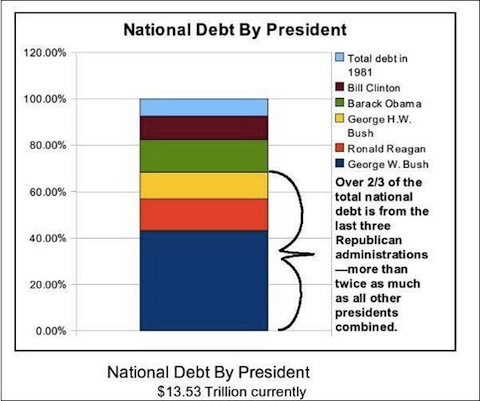Necronic
Staff member
Personally I think the waste comes from a couple of areas
1) Redundant government agencies: I was talking with someone who used to work with the ATF down in Columbia fighting FARK, and I asked him straight out "dude wtf? Isn't that what the DEA is supposed to be doing?", his response was "Don't get me started". There are way too many redundant agencies. NSA vs CIA vs Homeland Security. Agriculture Dept vs National Institute of Food and Agriculture. NIST (which does research) vs National Science Foundation. Bureau of Land Management vs Fish and Wildlife Services vs National Park Service vs USDA Forest Service
Not all of these are fully overlapping, in fact few are, but all of them overlap significantly enough that you are seeing double digit percentages in wasted or duplicated efforts. This is WHOLLY UNACCEPTABLE. It's almost like the opposite of a merger, where two groups come together and eliminate redundancies, here we have a single group that creates redundancies.
2) Information Technology/data logistics: It's not enough that the US government has byzantine recordkeeping across redundant departments, we also have to have terrible data management tools. The entire tax system seems founded on an inability to automate data management. This issue has gotten me close to striking a couple of government employees before where they ask me to give them information that there is absolutely no reason for them not to have already.
Think what this could do for Medicare/Medicaid. This could also vastly improve our national security as intelligence could be simultaneously more accessible and more secure. And hell, since this data would be publicaly available through FOIA you would be empowering legions of analysts to go through and to research for you.
But this can't effectively happen without first cleaning up #1 above. If each of these agencies independently develops an IT solution they will be putting in much more work than is necessary, and if they are eventually brought together they will have to spend a lot more money putting it all together.
3) Too much change too fast: There are logistical consequences of legislation, and these have price tags. The national healthcare bill had a significant price tag simply in the logistical aspects of it. Setting up offices, developing metrics, informing the populace of the system. And all of this is wasted effort when 3 years later the senate shouts "Shut it down".
A proper business operates on a 5-10 year launch cycle for major projects. There is a commitment involved. The government is more ADD though, starting something, getting 1/2 way through it then getting interested in the new shiny.
------------
A lot of this is OUR fault, by being people that are looking for the new shiny as the solution instead of the boring practical and entirely non-partisan solutions in business efficiency. Fiscal conservatives claim this as their goal but that is a completely fatuous statement that amounts to cutting off your n
1) Redundant government agencies: I was talking with someone who used to work with the ATF down in Columbia fighting FARK, and I asked him straight out "dude wtf? Isn't that what the DEA is supposed to be doing?", his response was "Don't get me started". There are way too many redundant agencies. NSA vs CIA vs Homeland Security. Agriculture Dept vs National Institute of Food and Agriculture. NIST (which does research) vs National Science Foundation. Bureau of Land Management vs Fish and Wildlife Services vs National Park Service vs USDA Forest Service
Not all of these are fully overlapping, in fact few are, but all of them overlap significantly enough that you are seeing double digit percentages in wasted or duplicated efforts. This is WHOLLY UNACCEPTABLE. It's almost like the opposite of a merger, where two groups come together and eliminate redundancies, here we have a single group that creates redundancies.
2) Information Technology/data logistics: It's not enough that the US government has byzantine recordkeeping across redundant departments, we also have to have terrible data management tools. The entire tax system seems founded on an inability to automate data management. This issue has gotten me close to striking a couple of government employees before where they ask me to give them information that there is absolutely no reason for them not to have already.
Think what this could do for Medicare/Medicaid. This could also vastly improve our national security as intelligence could be simultaneously more accessible and more secure. And hell, since this data would be publicaly available through FOIA you would be empowering legions of analysts to go through and to research for you.
But this can't effectively happen without first cleaning up #1 above. If each of these agencies independently develops an IT solution they will be putting in much more work than is necessary, and if they are eventually brought together they will have to spend a lot more money putting it all together.
3) Too much change too fast: There are logistical consequences of legislation, and these have price tags. The national healthcare bill had a significant price tag simply in the logistical aspects of it. Setting up offices, developing metrics, informing the populace of the system. And all of this is wasted effort when 3 years later the senate shouts "Shut it down".
A proper business operates on a 5-10 year launch cycle for major projects. There is a commitment involved. The government is more ADD though, starting something, getting 1/2 way through it then getting interested in the new shiny.
------------
A lot of this is OUR fault, by being people that are looking for the new shiny as the solution instead of the boring practical and entirely non-partisan solutions in business efficiency. Fiscal conservatives claim this as their goal but that is a completely fatuous statement that amounts to cutting off your n




